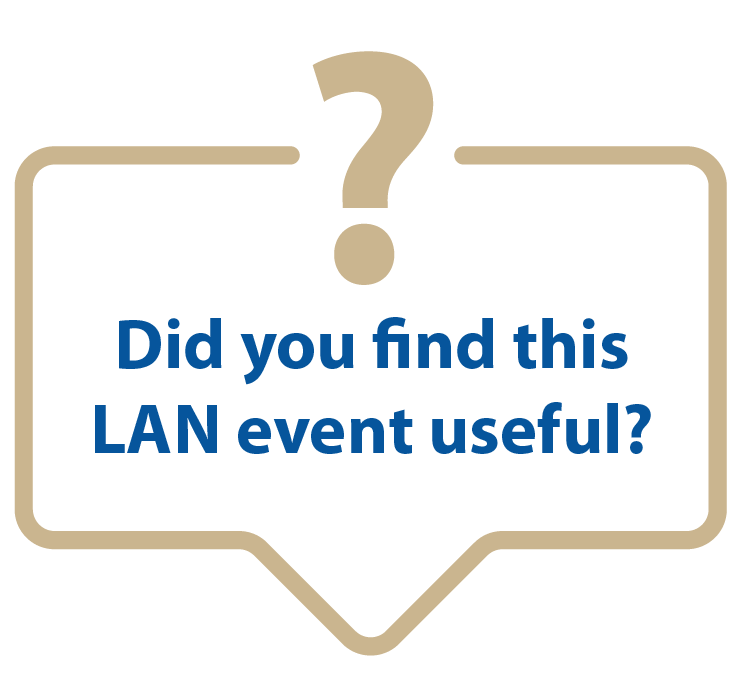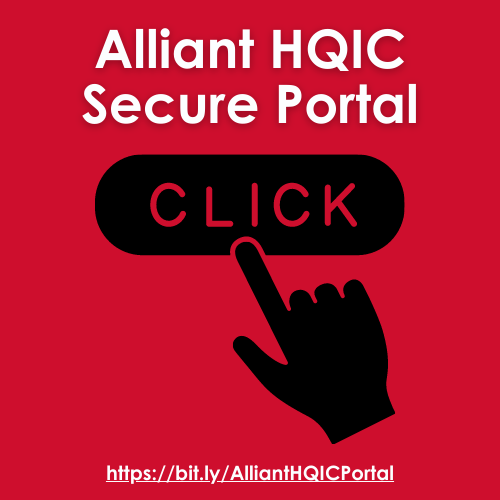|
|
|
|
This monthly newsletter highlights the latest insights, resources, and evidence-based best practices.
Our hope is that this newsletter makes it easy for you to stay on top of trends and allows you to provide the best possible care for those you work with and serve.
|
|
|

Save the Date: 2023 CMS Quality Conference
The CMS Quality Confernece will be held May 1-3, 2023. This annual conference serves as a critical opportunity for discussions around improving the quality of care and advancing equitable practices and outcomes for beneficiaries. Health care quality is at the core of the work CMS and its contractors do every single day.
Quality improvement is a foundational component of CMS’ mission, and this year's theme–Building Resilient Communities: Having an Equitable Foundation for Quality Healthcare–will guide conversations and improvements around health care quality improvement that spark solutions to address America's health system challenges and incredible opportunities ahead.
Registration opens in January. Mark your calendars!
|
Upcoming Learning and Action Network (LAN) Events
Connecting Your Hospital Culture of Safety to Patient Harm Reduction
Tuesday, January 17, 2023, from 3-4 p.m. ET
A patient safety session with separate breakout rooms to discuss pressure injuries, MDROs, sepsis and ADE opioids.
Register Here | View Agenda
Quality Leader Summit
Tuesday, January 17, 2023, from 1-2 p.m. ET
Join this exciting webinar to learn how the Alliant Hospital Quality Improvement Contractor (HQIC) program has improved patient outcomes for our 147 enrolled hospitals in the last two years. This webinar will also focus on patient and family engagement (PFE) and strategies to improve the five structural metrics. Hospitals will present their accomplishments and barriers in restarting and engaging their patient and family advisory councils (PFACs) to improve quality and patient safety. In addition, educational and networking opportunities planned for 2023 will be discussed.
Objectives:
- Review performance to date, 30-month target goals and forecasting trends.
- Discuss the five structural metrics for PFE and opportunities for improvement among the enrolled hospitals.
- Understand how hospitals are restarting PFACs after suspending activities during the COVID pandemic.
- Discuss upcoming educational and networking opportunities planned for 2023.
Register Here
Save the Date: Health Equity Framework and Action Planning
Tuesday, February 28, 2023, from 1-1:30 p.m. ET
Registration link coming soon.
HQIC Cohort Celebration
Recorded on November 30
A presentation on key learnings and interventions that led to improvement in hospitals that participated in the six-month patient safety cohorts. The common theme was the importance of having a physician champion or advisor.
View the Presentation and Recording
View All Upcoming Events Here

If Yes, Click Below.
Click here if you attended the June LAN event and were able to "use tomorrow" what you heard during the webinar.
View All Previous LAN Event Recordings
Community of Practice (CoP) Calls
CMS hosts CoP calls on the second Thursday of each month at 1 p.m. ET | 12 p.m. CT | 11 a.m. MT | 10 a.m. PT. The calls are open to all Alliant HQIC hospitals.
The Importance of Organizational Components in Pressure Injury Programs
Thursday, January 12
Hospital-acquired pressure injuries affect 2.5 million patients per year in the United States. Many organizations are in a reactive mode, only focusing on pressure injuries once they develop. This reactive approach leads to overutilization of expensive resources, increased patient cost, decreased quality of life and increased staff time to perform wound care. The goal of this presentation is to provide the framework for a proactive pressure injury program based on an evidence-based interdisciplinary approach. A wound consultant subject matter expert will review organizational best practices for senior leadership support, clinical leadership, a unit-based champions model, process support, policy updates, emergency medical record enhancements, data collection and analysis and staff education.
Register Here
Patient and Family Engagement: An Intervention for Improving Patient Safety and Quality
Recorded on December 8
Patient and family engagement (PFE) is an area of increasing importance for hospitals. Fostering PFE in health care can lead to measurable improvements in multiple aspects of hospital performance, including quality, safety, finances, patient experience, health outcomes and employee satisfaction. In this webinar, two rural hospitals shared their experiences increasing PFE to improve patient care and outcomes. In addition, participants learned about tools and resources to help hospitals promote stronger engagement with patients and families to achieve a meaningful results.
View the Recording and Presentation
Monthly Office Hours-IP Chat
 Office Hours-IP Chats are quarterly networking events to build knowledge, share experience and provide support for hospital infection preventionists. The events are hosted by Amy Ward, MS, BSN, RN, CIC, FAPIC. Office Hours-IP Chats are quarterly networking events to build knowledge, share experience and provide support for hospital infection preventionists. The events are hosted by Amy Ward, MS, BSN, RN, CIC, FAPIC.
Register for our upcoming event in January.
If you would like to schedule a one-on-one meeting with Amy, please let your quality advisor know. Questions? Contact Amy Ward at amy.ward@allianthealth.org.
|
 Alliant HQIC Online Portal Alliant HQIC Online Portal
Access the Alliant HQIC portal to view your assessments and measurement data, and chat with other HQIC-enrolled hospitals to share best practices, barriers and solutions. Download Portal Instructions to Get Started
Behavioral Health/Opioid Stewardship
Study: Older Opioid Patients Experience More Adverse Events After Injury
Chronic non-cancer pain Medicare patients with new opioid prescriptions who experience an injury—such as a fall or traumatic brain injury—have a 1.4 times greater risk of future opioid-related adverse events than patients without an injury. According to an Agency for Healthcare Research and Quality (AHRQ)-funded review in PLOS Medicine, the risk was highest in the 30 days before an adverse event. The findings indicated that identifying injuries that emerge after opioid initiation may assist in the early detection of older patients at high risk for adverse events such as overdoses.
Read the Study
Adverse Drug Events
Risk Factors for Opioid-Related Adverse Drug Events Among Older Adults After Hospital Discharge
In a study published by the Journal of the American Geriatrics Society, researchers found that opioid-related adverse drug events occurred in 7% of older adults discharged from the hospital with an opioid prescription. Identified risk factors can inform physician decision-making, conversations about risk, and the development and targeting of harm-reduction strategies. Read the Study
Antibiotic Stewardship
Empowerment of Nurses in Antibiotic Stewardship: A Social-Ecological Qualitative Analysis
A study published by the Journal of Hospital Infection provides insights into the importance of harnessing the contributions of nurses and acknowledging and enlarging their roles in antibiotic stewardship programs. Read Article
CAUTI/CLABSI
Study: Emergent Themes From a Quality Improvement Program for CLABSI/CAUTI Prevention in ICUs Amid the COVID-19 Pandemic
Healthcare-associated infection (HAI) prevention has been difficult for health care providers to maintain during the COVID-19 pandemic. A study published by the National Library of Medicine summarizes themes for maintaining infection prevention activities learned from implementing a quality improvement program during the pandemic. Read the Study
Sepsis
Study: Clinical Decision Support Improves Blood Culture Collection Before Intravenous Antibiotic Administration in the Emergency Department
Surviving Sepsis guidelines recommend blood cultures before administration of intravenous (IV) antibiotics for patients with sepsis or moderate to high risk of bacteremia. Clinical decision support that reminds emergency department providers to obtain blood cultures when ordering IV antibiotics may improve this process measure. Read the Study
Patient Safety
White Paper: From Safety-I to Safety-II
Safety-II acknowledges that many more things go right in systems, even in adverse situations. It considers the gap between work as designed and work as done: the ideal and the reality and understanding how workers anticipate and adapt to conditions and situations. Read More
NHSN
NHSN Reporting and COVID-19 Hospital Data Transitions
The National Healthcare Safety Network (NHSN) will assume responsibility for collecting COVID-19 hospital data in mid-December 2022. The Transition of COVID-19 Hospital Reporting webpage will be updated frequently with information about the transition of hospital COVID-19 data collection from TeleTracking to the NHSN. Data will continue to be posted publicly on HHS Protect and COVID Data Tracker. Facilities and groups can view their own data within the NHSN platform. For questions about the transition, email NHSN@cdc.gov with the subject “COVID-19 Hospital Data transition.”
Hospital-Acquired Infections (HAIs) and Infection Prevention
Video: Guidance on MRSA and C. diff Lab ID Reporting
Need guidance on the MRSA and C. diff Lab ID reporting? Check out the 20-minute presentation by Alliant’s Infection Prevention Technical Advisor. Watch Presentation
Readmissions/Care Transitions
Study: Evidence-Based Processes To Prevent Readmissions
30-day hospital readmissions are an indicator of quality of care, and hospitals are financially penalized by Medicare for high rates. Numerous care transition processes reduce readmissions in clinical trials. A study published by BMC Health Services Research examined the relationship between the number of evidence-based transitional care processes used and the risk standardized readmission rate (RSRR). Read the Study
Effectiveness of a Health Coaching Intervention for Patient-Family Dyads To Improve Outcomes Among Adults With Diabetes
According to the results of a randomized clinical trial with 239 patient-supporter dyads, Caring Others Increasing Engagement in Patient Aligned Care Teams (CO-IMPACT) intervention improved patient activation, diabetes self-efficacy and healthy eating. There were no between-group differences in diabetes-specific cardiac risk or glycemic control. Read the Report
Health Equity
AHRQ Releases Annual Update on U.S. Health Care Quality, Equity
The Agency for Healthcare Research and Quality (AHRQ) has released its 2022 National Healthcare Quality and Disparities Report (NHQDR), which provides policymakers, health system leaders and the public with a statistical portrait of how effectively the healthcare delivery system provides safe, high-quality and equitable care to all Americans. This year’s report includes data on four special emphasis topics: maternal health; child and adolescent mental health; substance use disorders; and oral health.
Read the Full Report | View NHQDR Data Tools
FY 2023 IPPS Final Rule
See below for details about health equity and social determinants of health in the FY 2023 Medicare Hospital Inpatient Prospective Payment Systems (IPPS) Final Rule
- IX. Quality Data – starts on page 1101
- E. Hospital IQR Program - Measure Set on pages 1177-1180
- Table IX.E-01 Five Attestation Domains on page 1187
View the FY 2023 IPPS Final Rule
|
Best Practices Corner
Fairview Park Hospital Awarded “A” Hospital Safety Grade from Leapfrog Group
Fairview Park Hospital in Dublin, Georgia, received an “A” Hospital Safety Grade from The Leapfrog Group. This national distinction celebrates Fairview Park Hospital's achievements in protecting patients from preventable harm and errors. Read More
|
Success Stories
Kansas Critical Access Hospital Prevents CAUTI and Decreases Catheter Days
Cheyenne County Hospital, a 16-bed critical access hospital in St. Francis, Kansas, has decreased catheter days per patient days in the last year and is currently maintaining a zero rate of catheter-associated urinary tract infections (CAUTI).

Cheyenne County Hospital recently participated in the HQIC performance improvement cohort based on two CAUTIs identified in 2021. A comprehensive review of current practices and analysis identified inappropriate catheter use as a root cause. The team implemented solutions that included:
- Physician champion and infection preventionist work together to promote appropriate catheter use, increase staff awareness and provide education.
- Team completed a policy review, and all staff who insert catheters now complete an annual competency for catheter insertion. The goal is 100% compliance by the end of 2022.
- A standard protocol was approved by the chief medical officer (CMO) that includes a nursing assessment/action flow sheet that guides the nurse through diagnosis, correct insertion and alternatives to foley use.
- Alternative methods were implemented, such as external female catheters and more scheduled toileting.
According to NHSN data, Cheyenne County Hospital is demonstrating a downward trend for CAUTI SIR All Units and is currently maintaining a zero rate. The two CAUTIs in 2021 were COVID patients.
In addition, Catheter Days per Patient Day shows a downward trend from January 2021 through August 2022 and is below the CY2019 baseline. The lowest data point is in August 2022.
By drilling down into the data and identifying end-of-life and OB patients with catheters, the team was able to distinguish catheter days and utilization reasons. As a result, there has been a significant decrease since January 2022. One of the lessons learned was that catheters are not for nurse conveniences. By following the protocol, the treatment for patients has improved.
Katie Bunker, RN, chief nursing officer/infection prevention, complimented the performance improvement advisory services provided by KFMC Health Improvement Partners, a subcontractor of Alliant HQIC.
“Nadyne [the Alliant HQIC quality advisor] has been an amazing resource for coming up with new ways of approaching each subject. Thank you for sharing our success story, and I hope we have many more,” Bunker said.
Congratulations to the team at Cheyenne County Hospital for their hard work and resiliency in improving patient care by decreasing CAUTI SIR All Units and Catheter Days per Patient Day.
To read other success stories, visit the Alliant HQIC website.
|
|
|
Connect with us!
    Click here if you'd like to share your corporate profiles with us and we'll connect with you!
Click here if you'd like to share your corporate profiles with us and we'll connect with you!
|
| |
Hospital Quality Improvement Project Collaborators


|
| |
For more information about Alliant Health Solutions, visit the website: www.allianthealth.org
For questions or information about free technical assistance, please contact:
Share this email with a friend or colleague:  
|
|
|
|
|